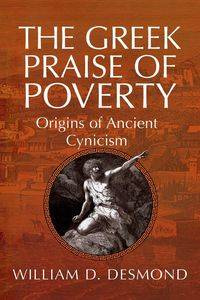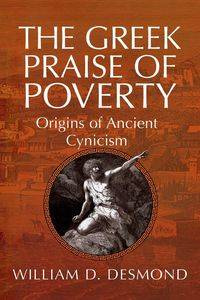The Greek Praise of Poverty - Desmond William D.
The Greek Praise of Poverty - Desmond William D.
- Origins of Ancient Cynicism
AutorzyDesmond William D.
EAN: 9780268025823
Symbol
623FTV03527KS
Rok wydania
2006
Elementy
256
Oprawa
Miekka
Format
15.2x22.9cm
Język
angielski

Bez ryzyka
14 dni na łatwy zwrot

Szeroki asortyment
ponad milion pozycji

Niskie ceny i rabaty
nawet do 50% każdego dnia
Niepotwierdzona zakupem
Ocena: /5
Symbol
623FTV03527KS
Kod producenta
9780268025823
Rok wydania
2006
Elementy
256
Oprawa
Miekka
Format
15.2x22.9cm
Język
angielski
Autorzy
Desmond William D.

William Desmond, taking issue with typical assessments of the ancient Cynics, contends that figures such as Antisthenes and Diogenes were not cultural outcasts or marginal voices in the classical culture of the fifth and fourth centuries B.C. Rather, the Cynic movement had deep and significant roots in what Desmond calls "the Greek praise of poverty." Desmond demonstrates that classical attitudes toward wealth were complex and ambivalent, and allowed for an implicit praise of poverty and the virtues it could inspire. From an economic and political point of view, the poor majority at Athens and elsewhere were natural democrats who distrusted great concentrations of wealth as potentially oligarchical or tyrannical. Hence, the poor could be praised in contemporary literature for their industry, honesty, frugality, and temperance. The rich, on the other hand, were often criticized as idle, unjust, arrogant, and profligate. These perspectives were reinforced by typical Greek experiences of war, and the belief that poverty fostered the virtues of courage and endurance. Finally, from an early date, Greek philosophers associated wisdom with the transcendence of sense experience and of such worldly values as wealth and honor. The Cynics, Desmond asserts, assimilated all of these ideas in creating their distinctive and radical brand of asceticism. Theirs was a startling and paradoxical outlook, but it had broad appeal and would persist to exert a manifold influence in the Hellenistic period and beyond.
EAN: 9780268025823
EAN: 9780268025823
Niepotwierdzona zakupem
Ocena: /5
Zapytaj o produkt
Niepotwierdzona zakupem
Ocena: /5
Napisz swoją opinię

